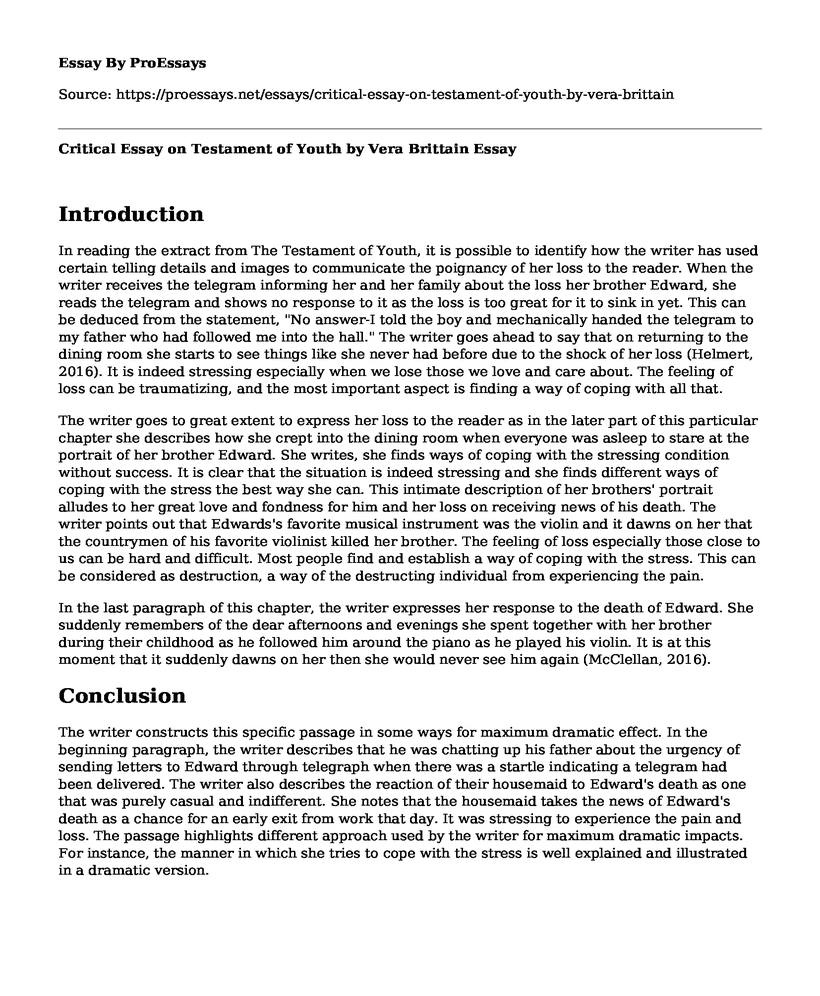Introduction
In reading the extract from The Testament of Youth, it is possible to identify how the writer has used certain telling details and images to communicate the poignancy of her loss to the reader. When the writer receives the telegram informing her and her family about the loss her brother Edward, she reads the telegram and shows no response to it as the loss is too great for it to sink in yet. This can be deduced from the statement, "No answer-I told the boy and mechanically handed the telegram to my father who had followed me into the hall." The writer goes ahead to say that on returning to the dining room she starts to see things like she never had before due to the shock of her loss (Helmert, 2016). It is indeed stressing especially when we lose those we love and care about. The feeling of loss can be traumatizing, and the most important aspect is finding a way of coping with all that.
The writer goes to great extent to express her loss to the reader as in the later part of this particular chapter she describes how she crept into the dining room when everyone was asleep to stare at the portrait of her brother Edward. She writes, she finds ways of coping with the stressing condition without success. It is clear that the situation is indeed stressing and she finds different ways of coping with the stress the best way she can. This intimate description of her brothers' portrait alludes to her great love and fondness for him and her loss on receiving news of his death. The writer points out that Edwards's favorite musical instrument was the violin and it dawns on her that the countrymen of his favorite violinist killed her brother. The feeling of loss especially those close to us can be hard and difficult. Most people find and establish a way of coping with the stress. This can be considered as destruction, a way of the destructing individual from experiencing the pain.
In the last paragraph of this chapter, the writer expresses her response to the death of Edward. She suddenly remembers of the dear afternoons and evenings she spent together with her brother during their childhood as he followed him around the piano as he played his violin. It is at this moment that it suddenly dawns on her then she would never see him again (McClellan, 2016).
Conclusion
The writer constructs this specific passage in some ways for maximum dramatic effect. In the beginning paragraph, the writer describes that he was chatting up his father about the urgency of sending letters to Edward through telegraph when there was a startle indicating a telegram had been delivered. The writer also describes the reaction of their housemaid to Edward's death as one that was purely casual and indifferent. She notes that the housemaid takes the news of Edward's death as a chance for an early exit from work that day. It was stressing to experience the pain and loss. The passage highlights different approach used by the writer for maximum dramatic impacts. For instance, the manner in which she tries to cope with the stress is well explained and illustrated in a dramatic version.
References
Helmert, M. J. (2016). The Inferiority Complex of Women during WWI: Represented in Testament of Youth by Vera Brittain and Diary without Dates by Enid Bagnold. https://theses.ubn.ru.nl/bitstream/handle/123456789/3695/Helmert%2c_M.J._1.pdf?sequence=1
McClellan, A. K. (2016). "I was my war; my war was I": Vera Brittain, autobiography and university fiction during the Great War. Paedagogica Historica, 52(1-2), 121-136. https://www.tandfonline.com/doi/full/10.1080/00309230.2015.1133676?scroll=top&needAccess=true
Cite this page
Critical Essay on Testament of Youth by Vera Brittain . (2022, Jul 08). Retrieved from https://proessays.net/essays/critical-essay-on-testament-of-youth-by-vera-brittain
If you are the original author of this essay and no longer wish to have it published on the ProEssays website, please click below to request its removal:
- Literary Essay Sample: Analysis of Advice to a Discarded Lover
- Literary Analysis Essay on "Two Words" and "A Very Old Man with Enormous Wings" by Isabel Allende
- Essay Sample on Ready Player One: A Dystopian Utopia of Realities, Competitions, and Identities
- Paper Example on Feminist Poetry: A Movement of Self-Realization & Social Awareness
- Essay Example on Portraying Culture in Literature: Examining Homer's 'The Odyssey'
- Essay Example on Virgil's Georgics: Exalting the Roman Agrarian Strategy
- Female Writers Unveil America's History Through Unique Perspectives - Research Paper







